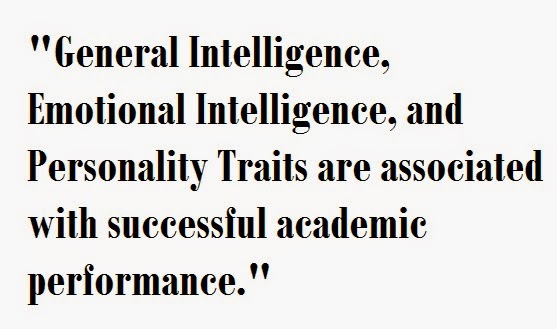Intelligence and its
various forms influence the fields that college graduates are likely to be
successful. Ever since Howard Gardner’s book Frames of Mind was published theorists
and educators have been trying to understand the multiple and complex ways of
knowledge accumulation. A journal article by Tai Fang-Mei (2014) highlights the
forms of intelligence that are appreciated in student learners and how these
intelligences should guide career paths.
Intelligence
has always been in debate in terms of how to measure and understand it. When
Gardner released his book it became possible to see intelligence on multiple
planes of existence. He included seven intelligences of verbal/
linguistic, visual-spatial, musical, intra-personal, interpersonal, logical mathematical,
and bodily-kinesthetic. Each uses different skills to navigate and understand
the environment.
We can see these intelligences at
work when a great play is written, a musical piece is masterfully played, and a
scientist finds a new discovery. The problem is that not all intelligences are
rewarded in society in precisely the same way and different intelligences can
lead to higher financial rewards. Society seems to appreciate certain types of
intelligences over others even though all have merit at different times and
places.
The study seems to focus on
encouraging incoming students to understand their intelligences and then using
those intelligences to encourage them select a suitable educational and career
path. Helping students to understand themselves and where their skill lays also
fosters a separation of socially bounded “expected” perceptions their friends
have to something they are most likely to be happy with. It is a process of
aligning goals with the skills that will get them there.
Putting a student in an art class
when their skills are heavily focused in the mathematical domains seems to be a
waste of talent unless there is a method of bridging that gap. Perhaps something
more focused in mechanical drawing or engineering would be helpful to match
interest and skill into something that results in gainful employment. Understanding
the student and the employment needs of society seems beneficial to proper
placement.
The study found that it is
helpful to students when they find out where their intelligences lay and then
use that knowledge to select a second major or minor. Students are often
unaware of where their skills lay and what that means in terms of future
employment. For example, English majors should also rank high in linguistics
skills. Helping students become aware of their innate and learned skills is a
process of awareness that pays off throughout their educational process.
Today’s Internet offers
opportunities to simply help students self-assess through quizzes valid tests
they can conduct independently. Such methods would better take student
misperceptions about life and employment and let them find matches between
their skills and viable career options that further their personal development.
The student still has the choice to use or ignore them but administrators have
a place to point students that are struggling with majors. Not all things can
be measured but they can help an indecisive student make a better decision.
Fang-Mei,
T. (2014). Exploring multiple intelligences. The Journal of Human Resource
and Adult Learning, 10 (1).

